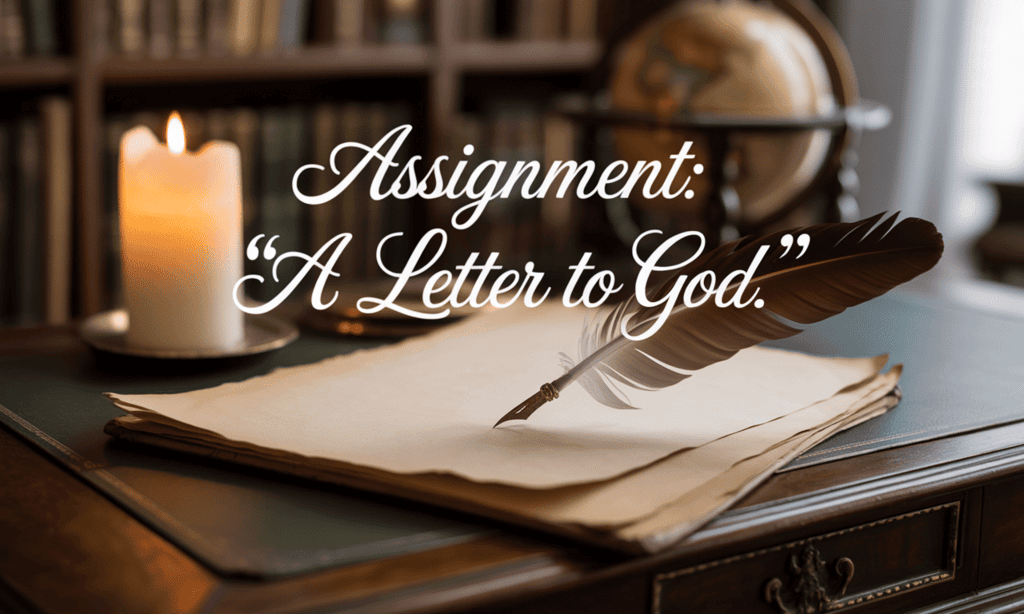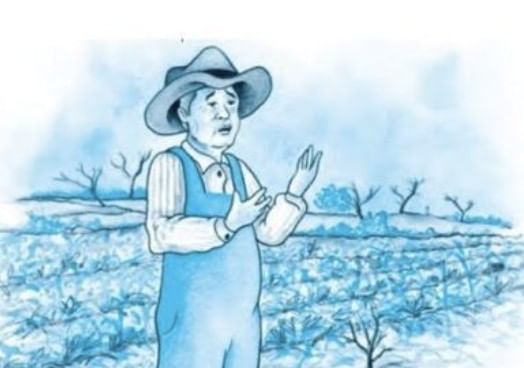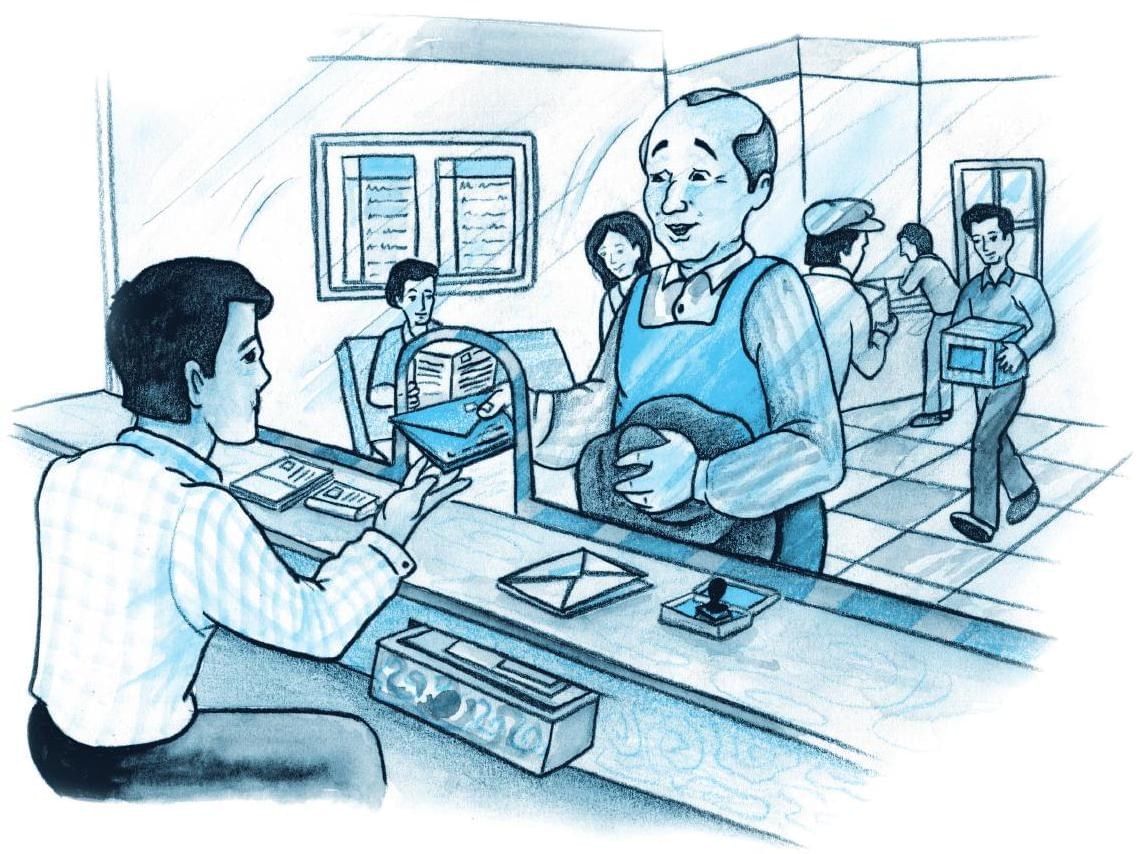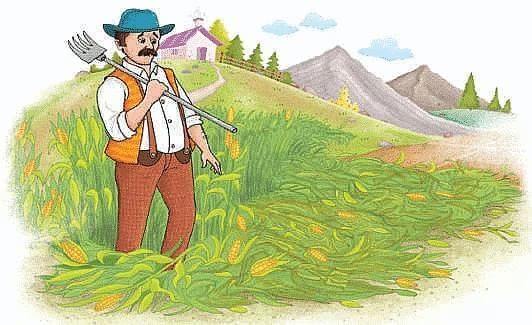Class 10 Exam > Class 10 Notes > English Class 10 > Assignment: “A Letter to God”
Assignment: “A Letter to God” | English Class 10 PDF Download
| Table of contents |

|
| Comprehension Questions (MCQs) |

|
| Short Answer Questions |

|
| Character Sketch |

|
| Creative Writing Task |

|
| Vocabulary Building – “Guess the Word” Activity |

|

Comprehension Questions (MCQs)
Read the excerpt below and answer the questions that follow:
“It was during the meal that, just as Lencho had predicted, big drops of rain began to fall... The big drops are ten cent pieces and the little ones are fives.”
Q1: What does Lencho’s comparison of raindrops to coins suggest?
(a) He thinks the rain is expensive
(b) He values rain as it brings prosperity
(c) He wants to collect the rain
(d) He is greedy for money
Correct option: (b)
Explanation: Lencho sees rain as a sign of a good harvest, which means income for his family.
Q2: What mood is created by the description of the rain at the beginning?
(a) Disappointment
(b) Fear
(c) Happiness and hope
(d) Anger
Correct option: (c)
Explanation: The family is joyful as the rain is expected to ensure a good crop.
Q3: Why did the family come in for dinner?
(a) To hide from hail
(b) Because the meal was ready
(c) Because it was raining
(d) They were afraid
Correct option: (b)
Explanation: The woman called everyone for dinner as it was mealtime.
Q4: What was the tone of Lencho’s exclamation, “These aren’t raindrops...”?
(a) Sarcastic
(b) Joyful and hopeful
(c) Disappointed
(d) Angry
Correct option: (b)
Explanation: Lencho sees the rain as a blessing and wealth.
Q5: What sudden change disrupted Lencho’s happiness?
(a) Floods
(b) Drought
(c) Hailstorm
(d) Earthquake
Correct option: (c)
Explanation: A hailstorm destroyed the crops, replacing the joy with sadness.
Short Answer Questions
Q1: Why did Lencho write a letter to God?
Ans: Lencho wrote a letter to God seeking 100 pesos after a hailstorm destroyed his crops. He believed only God could help him feed his family and sow seeds again.
Q2: How did the postmaster react on seeing Lencho’s letter?
Ans: At first, the postmaster laughed, but later admired Lencho’s faith. He decided to collect money and reply as “God” to preserve Lencho’s belief.
Q3: Why was Lencho disappointed after receiving the money?
Ans: Lencho received only 70 pesos instead of the 100 he asked for. He was upset and assumed the post office employees had stolen the rest.
Q4: What does the story tell us about faith and irony?
Ans: The story highlights unshakable faith through Lencho. Ironically, he doubts the helpers who made his faith come true, showing how blind belief can mislead.
Q5: What kind of man was Lencho? Use two adjectives.
Ans: Lencho was hopeful and naive. He believed strongly in divine help, but also showed a lack of awareness about the real world.
Character Sketch
Q1: Write a character Lencho.
Ans: Lencho is a poor but hardworking farmer living with his family in a solitary house on a hill, deeply connected to his fields and the rain they depend on. Simple-hearted yet strong and sturdy “like an ox,” he also has practical knowledge of the weather, winds, and rains of his region. He is literate and knows how to write, and he—and his wife—are highly religious; his faith in God is unshakable and he believes God helps those with a clear conscience. When a hailstorm ruins his crop and the family is on the verge of starvation, he writes a letter to God, sincerely expecting a reply—showing emotional strength and spiritual depth. The postmaster, moved by this faith, collects money to help him, but Lencho naively assumes the post office employees have kept back some of “God’s money” and calls them a “bunch of crooks.” This irony reveals his unquestioning trust in divine help but a tendency to misjudge human kindness, highlighting both his innocence and his limitations alongside his courage, devotion, and resilience.

Creative Writing Task
Q1: Lencho believed in God during a crisis. Think of a time when you had to trust something or someone during a difficult moment. What was the outcome? Write an essay with an appropriate heading.
Ans: Faith in Difficult Times
During my mid-term maths exam, I opened the paper and my mind went blank. Weeks of study vanished in a moment. My hands shook, and I felt like walking out.
Then I remembered my parents’ line: “Have faith, stay calm.” I closed my eyes, said a short prayer, took three slow breaths, and decided to trust two things—my preparation and a simple plan. First, I underlined the easiest questions. Next, I wrote short points for whatever I could recall. As my pen moved, more ideas returned. Step by step, the fog lifted. I completed the paper on time.
The result was not a perfect score, but it was much better than I feared. More importantly, I learned that faith is active: it steadies your mind so you can act wisely. Like Lencho, who trusted God in his crisis, I chose trust in that difficult moment—trust in myself, in my preparation, and in a calm method. His faith brought him help; mine brought clarity and courage.
Lesson: Faith may not erase the problem, but it gives you the strength to face it—and often, that is enough to change the outcome.
Vocabulary Building – “Guess the Word” Activity
Clue 1: A strong belief in someone or something, even without proof.
Word: Faith
Explanation: Lencho had faith in God, believing he would receive help.
Clue 2: A natural disaster involving frozen rain pellets.
Word: Hailstorm
Explanation: It destroyed Lencho’s crops completely.
Clue 3: A person who sends or receives letters and parcels.
Word: Postman
Explanation: The postman helped deliver and even collect money for Lencho.
Clue 4: To express sadness and hopelessness.
Word: Sorrowful
Explanation: The night after the storm was sorrowful for Lencho and his family.
Clue 5: The inner voice that tells you right from wrong.
Word: Conscience
Explanation: The story says God sees even what lies deep in one’s conscience.
The document Assignment: “A Letter to God” | English Class 10 is a part of the Class 10 Course English Class 10.
All you need of Class 10 at this link: Class 10
|
61 videos|620 docs|69 tests
|
FAQs on Assignment: “A Letter to God” - English Class 10
| 1. What is the main theme of "A Letter to God"? |  |
Ans. The main theme of "A Letter to God" revolves around faith, hope, and the relationship between humans and the divine. It explores how Lencho, a farmer, expresses his unwavering belief in God, even in the face of adversity, and highlights the significance of trust and the human spirit.
| 2. Who is the protagonist of the story, and what are his characteristics? |  |
Ans. The protagonist of the story is Lencho, a hardworking and devoted farmer. He is characterized by his strong faith in God, resilience in the face of challenges, and a deep connection to nature. His optimism and determination are evident as he seeks help from God during difficult times.
| 3. How does Lencho's faith in God influence his actions throughout the story? |  |
Ans. Lencho's faith in God is the driving force behind his actions. When a hailstorm destroys his crop, he writes a letter to God asking for financial assistance. His unwavering belief leads him to expect a response, which illustrates how faith can shape one's perspective and actions, even in dire situations.
| 4. What is the significance of the ending of "A Letter to God"? |  |
Ans. The ending of "A Letter to God" is significant because it reveals the irony of Lencho's situation. While he receives money from the post office, he is disappointed that it is not the full amount he requested from God. This highlights the themes of faith, human generosity, and the complexities of expectation versus reality.
| 5. What moral lesson can be drawn from "A Letter to God"? |  |
Ans. A key moral lesson from "A Letter to God" is the importance of maintaining faith and hope, even in challenging circumstances. It emphasizes the idea that while one can seek help from a higher power, human kindness and support can also play a crucial role in overcoming difficulties.
Related Searches





















